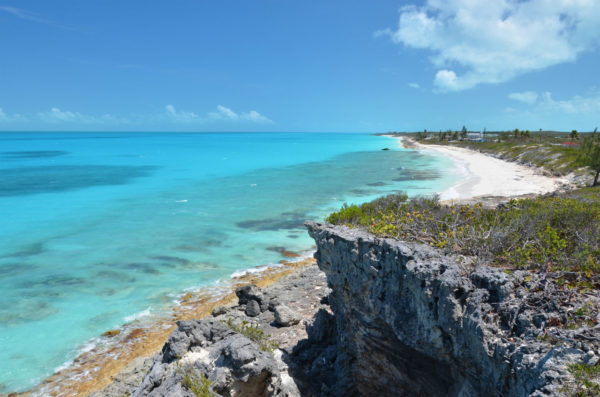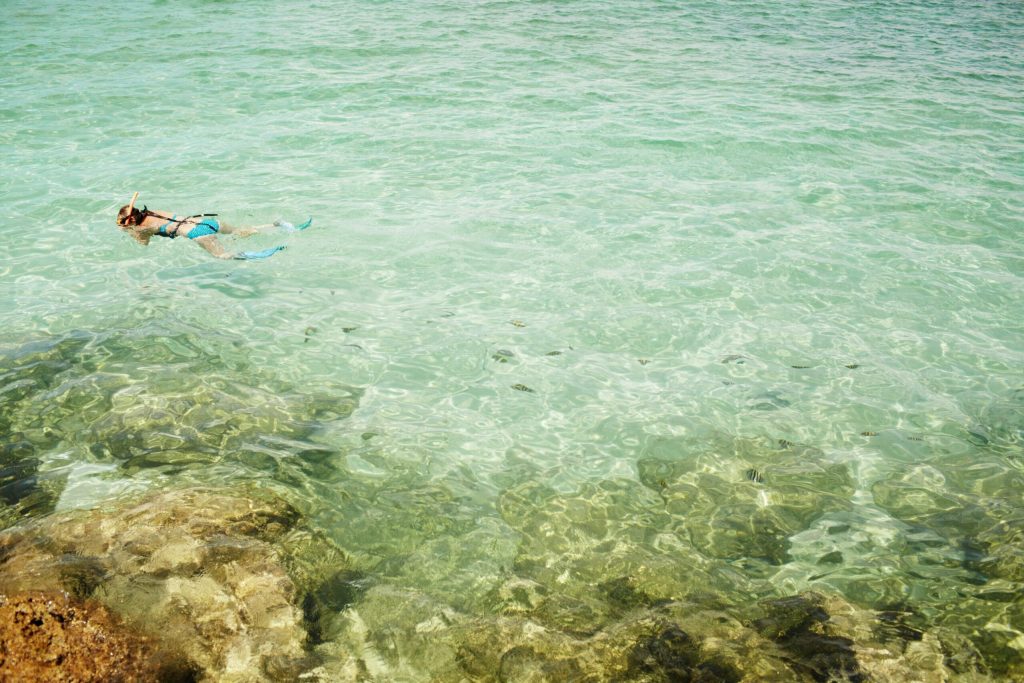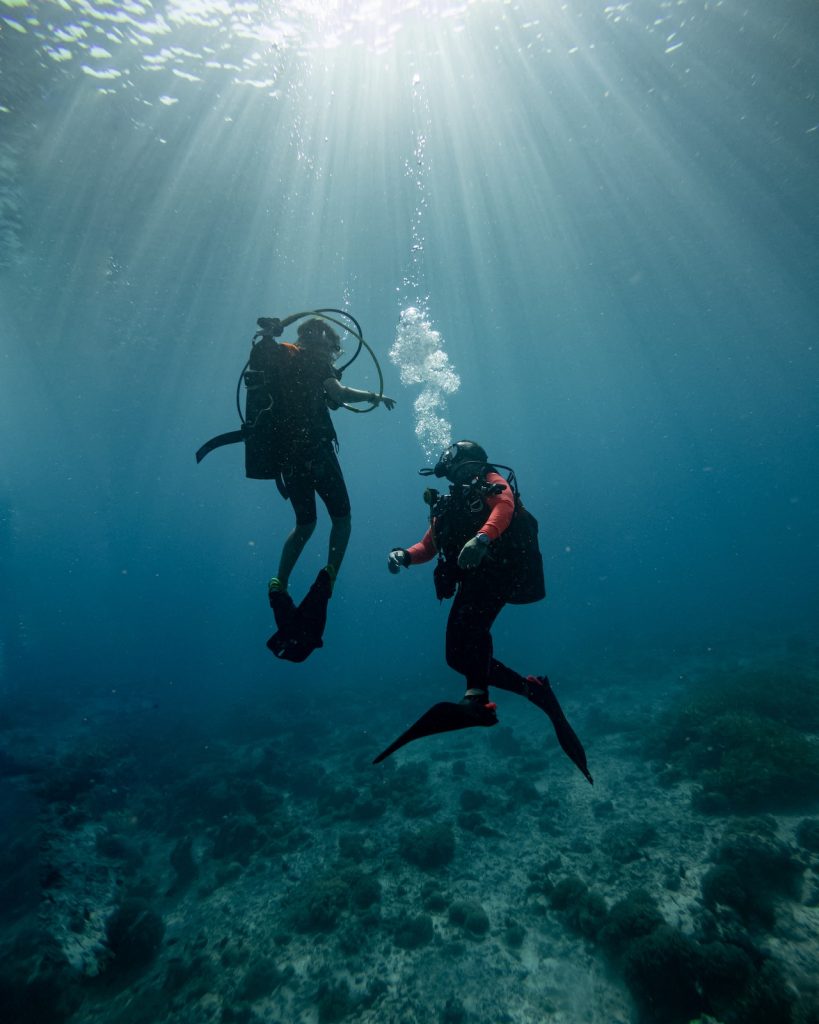Yes, there are sharks in the Caribbean. In fact, they are very common. Sharks love warmer waters and a hunting ground with diverse marine life. While this can be a little concerning if you’re heading to any of the beautiful Caribbean islands, you don’t need to worry. Shark attacks in the Caribbean are very rare (and hardly ever fatal), and there are plenty of ways to avoid encounters.
In this article we’ll tell you all you need to know about sharks in the Caribbean and how to stay safe.

Why Are There Sharks in the Caribbean?
The Caribbean’s warm waters allow coral reefs to grow and thrive. These reefs attract animals like dolphins, fish, turtles, and crustaceans, which are all great treats for sharks. Sharks are very important members of their marine ecosystem. Without them we wouldn’t have healthy oceans.
If you’re heading to the Caribbean, you’ll want to pay attention to your surroundings–both so you can see these incredible creatures and so you can stay safe.
Are There Many Sharks in the Caribbean?
Yes, there are quite a few sharks in the Caribbean. The different species include Reef, Nurse, Bull, Tiger, Lemon, Blacktip, and even Great Hammerhead Sharks.
Are There Dangerous Sharks in the Caribbean?
While most of the sharks in the Caribbean are not considered dangerous, there are a few types that have been known to attack humans. These include Bull and Tiger sharks.
What Kinds of Sharks Are in the Caribbean?
The Caribbean is home to plenty of different shark species, but thankfully this doesn’t include some more aggressive types such as Great Whites. Different sharks are more common around different islands and at different depths, but each of the types below can be seen in this region of the world.

Caribbean Reef Shark
The most common type of shark in the Caribbean is the Caribbean Reef Shark. Their most distinguishing features include a dusky color on their fins and a short, pointed snout.
Do Caribbean reef sharks attack humans? Not usually. Caribbean Reef Sharks are not known to be overly aggressive. In fact, there are few (if any) attacks connected to this type of shark. Really, the Reef Sharks tend to be a little more shy around humans. But they are curious and can attack if they mistake you for a food source, or if they are provoked.
Blacktip Shark
Another common shark in the Caribbean is the Blacktip Shark. These sharks look very close to the Caribbean Reef Shark with one big difference. The Blacktip Shark has, well, black tips on all of its fins.
They are also a shy species but can be more aggressive around food. You’ll want to be a little more cautious if you see these types of sharks while diving.

Nurse Shark
Nurse Sharks are another incredible species of shark. Unlike many other sharks, Nurse Sharks are found on the floor of the ocean near the coast. These sharks are usually dormant during the day and go hunting for crustaceans and mollusks at dusk.
These sharks rarely attack humans. They often float along sleepily and stay away from humans altogether. In those few cases that Nurse Sharks have attacked humans, it’s because divers harassed them by pulling on their tails.
Lemon Shark
Lemon Sharks are somewhat aggressive sharks that are generally either yellow or brown. You will likely encounter them in shallow waters, especially near mangrove forests. However, they are not commonly a threat to humans, with just 10 unprovoked attacks on record and none of them fatal.

Tiger Shark
The Tiger Shark is the second largest predatory shark in the world, so it’s best to keep your distance. Tiger Sharks are known to be highly aggressive like the Great White and Bull Sharks. Because of their aggressive nature, these sharks have been known to attack humans.
This species is also known to eat just about anything, so you don’t want to make it think you’re a good snack. They will eat anything from sea turtles to birds, dolphins, and even smaller sharks. While they are not looking for humans, they might mistake you for one of their favored foods.
Great Hammerhead Shark
The Great Hammerhead Shark has one of the most iconic physical builds of any other type of shark. Their blunt, flat head gives it the appearance of a hammerhead. Even though many people are excited to catch a glimpse of these incredible creatures, they are hard to find. There are a shrinking number of Great Hammerhead Sharks, so if you do see one, treasure it!
However, they are also predatory and can be aggressive, so keep your distance. While the Great Hammerhead Shark can be found throughout the Caribbean, they are most common in the waters around Grand Cayman. There is an underwater cliff called the North Wall that is a common hangout for Great Hammerheads.

Whale Shark
The Whale Shark species is unlike any other shark species. They are the largest type of shark and don’t use sharp teeth to rip and tear through their prey. These sharks are mouth-feeders, like true whales, and feed on things like krill, plankton, and small fish. They are gentle and not known for attacking humans.
Where Are Sharks in the Caribbean?
You can find sharks throughout the Caribbean, but there are a few islands that have a higher concentration of sharks. Most of these are known as excellent places to be able to safely see sharks while snorkeling or scuba diving.

However, if you’re worried about seeing sharks you might want to stay away from The Bahamas. These islands have the most recorded Caribbean shark attacks, with 32 unprovoked attacks during their history. This is likely due more to the large number of people in the water in this area, rather than excessive numbers of sharks–and it’s still a very low amount of attacks overall. But areas like the West End on Grand Bahama Island are known to be “shark infested” and are best avoided.
If you’re interested in safe encounters, though, a great place to see sharks in the Caribbean is around the coral reefs off the coast of Aruba. Sharks like the Caribbean Reef and Whale sharks like to spend their time hunting around these beautiful natural feeding grounds.
Great Hammerhead sharks can also be seen in deeper waters around Aruba, by the continental shelf.
If you’re wanting a less dangerous, calmer species of shark, then you might want to spend some time around the coast of Jamaica. These waters are home to Nurse sharks, which are the most docile species of shark.

On the other hand, Jamaica is also home to two of the most dangerous sharks in the Caribbean: Tiger and Bull sharks. The good news is that these animals are usually most active at night and in deeper waters, although Bull sharks have been known to swim in shallower waters.
Turks and Caicos is another area with thriving coral reefs that attract sharks like the Gray Reef Shark, Lemon Shark, and Nurse Shark. All of these sharks are less aggressive and give divers the chance for a safer close-up experience.

Caribbean Shark Attacks
It can be intimidating to swim in the ocean, especially when there are dozens of shark species swimming around. But the truth is, shark attacks in the Caribbean are very rare. There have been fewer than 100 shark attacks in the Caribbean in almost 300 years.
In fact, swimming with sharks is a common activity throughout the Caribbean, and it continues to grow in popularity. The activity is a good way to experience these amazing creatures up close and in a safer environment. Just remember to practice caution and do some research about the company running the shark experience.
Plus, it’s good to remember that most shark attacks aren’t predatory–the shark isn’t looking to attack a human. A bite is how a shark investigates a potential food source, and once they’ve discovered you’re not a fish they will often move on.
They will also bite if provoked, so treat even the most docile types with caution and don’t get too close or try to touch them. It’s always a good idea to practice shark safety whenever you’re in the ocean.

Practices to Prevent Caribbean Shark Attacks
If you follow some safety recommendations, you can greatly reduce your chances of being attacked by a shark–which is good news given that your overall odds of a shark attack are about one in 3.7 million as it is.
Sharks tend to feed at dawn, dusk, and nighttime, so stay out of the water then. Don’t wear jewelry, items, or clothing that flashes or sparkles, as it could look like fish scales. If you have any sort of cut or are bleeding in any way–no matter how small–stay out of the water. And unless you’re an expert, avoid spearfishing.
Don’t swim alone; try to keep plenty of people around you. Pay attention to your surroundings; if you see large schools of fish suddenly swimming away, a shark may be approaching. And if you do encounter a shark, don’t approach it–swim slowly away and avoid splashing or making sudden moves.
So yes, while there are sharks in the Caribbean, this shouldn’t keep you from visiting. If you follow the guidelines above, you should have a safe experience whether or not you want to encounter these remarkable creatures.

